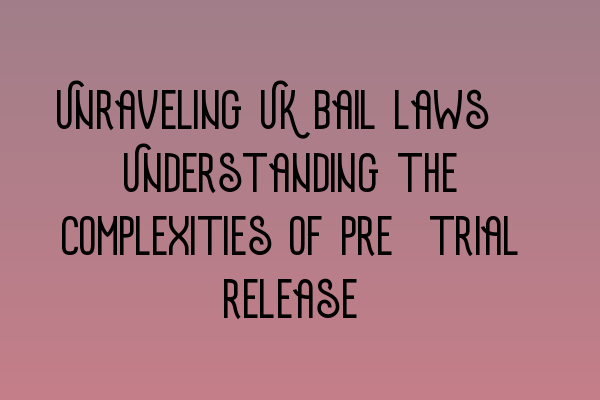Unraveling UK bail laws: Understanding the complexities of pre-trial release
When it comes to criminal proceedings in the UK, one area that often confuses both defendants and their solicitors is bail. The process of securing pre-trial release can be complex and filled with legal requirements that must be navigated meticulously. In this article, we will delve into UK bail laws and shed light on the intricacies of pre-trial release.
What is bail?
Bail refers to the temporary release of an accused person before their trial. It allows individuals to return to their normal lives while awaiting court proceedings, provided they abide by certain conditions imposed by the court. The purpose of bail is to strike a balance between the interests of justice and the individual’s right to liberty.
Types of bail
There are various types of bail available in the UK, each with its own set of conditions and requirements. Recognizance bail, also known as police bail, is the most common form. It involves the accused being released on the promise to appear at court on a specified date, without having to provide any financial security.
On the other hand, surety bail requires the accused to provide a monetary deposit as security to ensure compliance with bail conditions. This type of bail is typically used when the court considers the accused to be a flight risk.
Factors considered in granting bail
When deciding whether to grant bail, the court considers several factors. These include the seriousness of the offense, the likelihood of the accused absconding, the risk of reoffending, and the potential danger posed to the public. The court also takes into account the defendant’s personal circumstances, such as their ties to the community, employment status, and previous criminal history.
General conditions of bail
Regardless of the type of bail granted, there are several general conditions that defendants must adhere to. These often include surrendering travel documents, reporting to a police station at regular intervals, and refraining from contacting certain individuals or visiting specific locations.
The court may also impose specific conditions tailored to the individual case. These could include electronic monitoring, drug or alcohol testing, or residing at a specified address.
Failure to comply with bail conditions
Failure to comply with bail conditions can result in serious consequences. The court may issue a warrant for the arrest of the defendant, and they may be remanded in custody until their trial. Additionally, failure to comply with bail conditions can be taken into account during the trial itself and may impact the final verdict.
Seeking legal advice
If you or a loved one are facing criminal charges and require assistance with the bail process, it is crucial to seek professional legal advice. A skilled solicitor specializing in criminal law can guide you through the complexities of UK bail laws and help secure the best outcome for your case.
At SQE Criminal Law & Practice Law UK, we offer comprehensive legal services for individuals involved in criminal proceedings. Our experienced solicitors can provide expert advice and representation throughout the bail process, ensuring your rights are protected.
To learn more about SQE preparation, mock exams, and upcoming exam dates, check out these related articles:
- SQE 1 Practice Exam Questions
- SQE 1 Practice Mocks FLK1 FLK2
- SQE 2 Preparation Courses
- SQE 1 Preparation Courses
- SRA SQE Exam Dates
Ensure you are well-prepared for your legal career by utilizing the resources and expertise offered by SQE Criminal Law & Practice Law UK. Contact us today to learn more!
